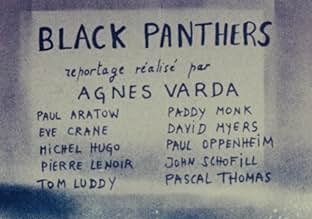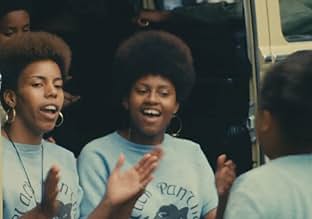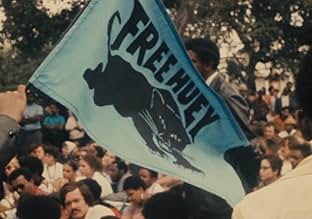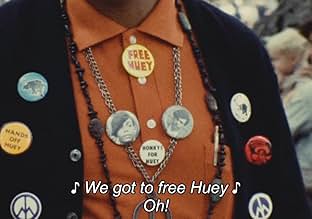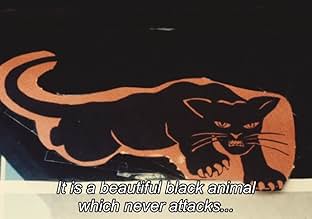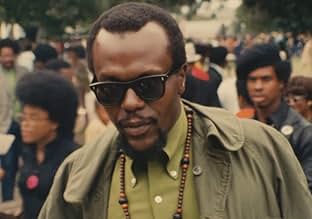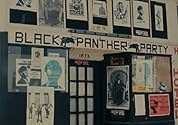ÉVALUATION IMDb
7,4/10
2,9 k
MA NOTE
Ajouter une intrigue dans votre langueA short film of interviews and protests at a rally to free Huey P. Newton.A short film of interviews and protests at a rally to free Huey P. Newton.A short film of interviews and protests at a rally to free Huey P. Newton.
H. Rap Brown
- Self
- (uncredited)
Ron Dellums
- Self
- (uncredited)
James Forman
- Self
- (uncredited)
Bobby Seale
- Self
- (uncredited)
Avis en vedette
Bless Agnès Varda for making this short documentary, and for the most part simply allowing members of the Black Panthers to state their views and explain the motivation behind the Black Power movement. The issues are the same as those faced today by the community, and it certainly resonates to hear them speak of stopping the police from killing black people, or of incarceration as being stilted against minorities. The film was made around the time of the Huey Newton trial, and after governor Ronald Reagan had hypocritically overturned California's open carry law once black people started taking advantage of it. Mostly it consists of footage of people at rallies to "Free Huey!," interviews with leaders like Newton and Stokely Carmichael, and comments from supporters. It also includes great commentary from Kathleen Cleaver explaining the significance of black women wearing their hair naturally, in afros.
The film is a snapshot in time during the summer of 1968 which made it fascinating to me, but I wish it had been longer and more fleshed out. It probably should have also asked a critical question or two about the movement looking to Mao Zedong as a role model, given the brutality of his regime and the millions he killed. On the other hand, millions of black people had (and have) died in the system they were in with its widespread racism, so one can understand searching for an alternative, and becoming as assertive as they did when progress didn't just gradually happen. I loved how Varda provided a few moments of gentle narration, explaining to audiences the reasons for what seemed like a dangerous and possibly violent movement. This is well worth a half hour, and something to reflect on over half a century later.
The film is a snapshot in time during the summer of 1968 which made it fascinating to me, but I wish it had been longer and more fleshed out. It probably should have also asked a critical question or two about the movement looking to Mao Zedong as a role model, given the brutality of his regime and the millions he killed. On the other hand, millions of black people had (and have) died in the system they were in with its widespread racism, so one can understand searching for an alternative, and becoming as assertive as they did when progress didn't just gradually happen. I loved how Varda provided a few moments of gentle narration, explaining to audiences the reasons for what seemed like a dangerous and possibly violent movement. This is well worth a half hour, and something to reflect on over half a century later.
I've been deeply impressed by earlier work by Varda; when this happens with me the filmmaker's whole journey becomes a lifelong project. I have several of these running, open-ended affairs with creative, alert souls who I know I can always turn to for a far- reaching view.
This is a small snapshot, but no less part of the journey. It's among a few political films she did at the same time as Godard and others, with Vietnam booming in the distance.
It's a look at a rally party of the Black Panthers at the time of Huey Newton's trial for the murder of a policeman, but there's nothing more they can offer Varda's camera than sloganeering and Varda had no more time to devote into it, perhaps not the inclination to probe more and inquire. Possibly she was interested in no more than this glimpse in passing.
It says something that she was there of course, yet she also makes it a point to ask some of the rapt faces if they know Huey didn't do it; they don't, but they're fervent just the same, it's all part of a war being waged on them, Huey is a prisoner of that war, he must go free, or else.
There's a much more sobering history prior to and as we move away from that day, based on what little I know; the obsession with territory and tribal law, and on the other hand police abuse and a youthful life without prospects that would turn Southcentral LA into Beirut, but you have to remind yourself that this is all simmering behind the ideology and parades, the image barely able to contain a life that would soon spill from it.
Politics are thin, but maybe it is all here anyway for you to deepen? Politics aside, the glimpse is worthwhile. It's a day in that life, that place, that furor about injustice.
This is a small snapshot, but no less part of the journey. It's among a few political films she did at the same time as Godard and others, with Vietnam booming in the distance.
It's a look at a rally party of the Black Panthers at the time of Huey Newton's trial for the murder of a policeman, but there's nothing more they can offer Varda's camera than sloganeering and Varda had no more time to devote into it, perhaps not the inclination to probe more and inquire. Possibly she was interested in no more than this glimpse in passing.
It says something that she was there of course, yet she also makes it a point to ask some of the rapt faces if they know Huey didn't do it; they don't, but they're fervent just the same, it's all part of a war being waged on them, Huey is a prisoner of that war, he must go free, or else.
There's a much more sobering history prior to and as we move away from that day, based on what little I know; the obsession with territory and tribal law, and on the other hand police abuse and a youthful life without prospects that would turn Southcentral LA into Beirut, but you have to remind yourself that this is all simmering behind the ideology and parades, the image barely able to contain a life that would soon spill from it.
Politics are thin, but maybe it is all here anyway for you to deepen? Politics aside, the glimpse is worthwhile. It's a day in that life, that place, that furor about injustice.
In 1968 the Black Panther Party (BPP) was at its most active and probably its height of popularity. This very brief documentary has several interviews/speeches which give a quick glimpse into what the BPP was demanding. There is footage of Kathleen Cleaver, Stokely Carmichael, and Huey Newton (one of the founders of the BPP). Kathleen and Stokely are two very well-spoken civil rights activists, or freedom fighters if you dare, and that is evident in this short documentary. At the time of this documentary Huey P. Newton, , was locked up for getting into a shootout with police. There is a little commentary from the documentarian, Agnes Varda, but just about everything else comes from the mouths of the Panthers themselves.
I hadn't seen any of Agnes Varda's films until I caught The Gleaners and I a few months ago at a film festival. I loved it, mainly because of Varda's extremely personal aproach to some interesting material and questions. I was recently doing some research on sixties activism when I stumbled across Black Panthers, Varda's 1968 documentary about the Black Panther Party.
The 30 minute long film looks at a rally to free the party's leader, Huey P. Newton. There's no pretense of objectivity -- the Black Panther Party shared in the copyright. Speakers at the rally included Bobby Seale, Stokely Carmichael, and H. Rap Brown, and there's also a short interview with Newton, in prison. Other segments include white people at a firing rage (some of which are children), and members of the police department explaining the gear they carry in the trunks of their cars.
This film documents some of the most important and controverial black leaders of the late 60s, and is a must see for anyone interested in sixties radicalism ot the Panthers.
The 30 minute long film looks at a rally to free the party's leader, Huey P. Newton. There's no pretense of objectivity -- the Black Panther Party shared in the copyright. Speakers at the rally included Bobby Seale, Stokely Carmichael, and H. Rap Brown, and there's also a short interview with Newton, in prison. Other segments include white people at a firing rage (some of which are children), and members of the police department explaining the gear they carry in the trunks of their cars.
This film documents some of the most important and controverial black leaders of the late 60s, and is a must see for anyone interested in sixties radicalism ot the Panthers.
The Black Panthers are organizing in Oakland to rally for Huey P. Newton's freedom. He and Bobby Seale had used their second amendment freedom to monitor the police force which was well-known to be oppressive. It talks about the killing of an unarmed young black man by the police. It's a documentary of the black power movement of that time. It sounds very familiar. There are differences. It's a bigger movement today and a more wide-spread one. Back in the day, the mostly black movement has to deal with the Vietnam war but most other issues remain the same. There is a bending toward justice over the years and it's always interesting to see the progression.
Le saviez-vous
- AnecdotesThis film is included in "Eclipse Series 43: Agnès Varda in California", released by Criterion.
- Citations
Narrator: The panther was chosen as their symbol. It is a beautiful black animal which never attacks, but, defends itself ferociously.
- ConnexionsFeatured in Berkeley in the Sixties (1990)
Meilleurs choix
Connectez-vous pour évaluer et surveiller les recommandations personnalisées
Détails
Contribuer à cette page
Suggérer une modification ou ajouter du contenu manquant

Lacune principale
By what name was Black Panthers (1968) officially released in India in English?
Répondre
